U.S. Department of Transportation
Federal Highway Administration
1200 New Jersey Avenue, SE
Washington, DC 20590
202-366-4000
Focus
| Accelerating Infrastructure Innovations |
Publication Number: FHWA-HRT-08-017
Date: September 2008
Faced with the daunting combination of aging highway infrastructure, rising congestion, and shrinking budgets, transportation departments nationwide are looking for new methods to meet these challenges and reconstruct and rehabilitate roads and bridges better, faster, safer, and more cost effectively. Innovations that are transforming today's project development and delivery process include alternative contracting methods such as warranty contracting, design-build, and performance contracting for construction. Using the performance contracting approach, a transportation agency defines a desired project outcome and then allows the contractor to determine how to carry out the work to meet the performance goals, following the acceptance methods and criteria, rather than specifying the methods to be used.
"Where project outcomes are clear and mutually understood, performance contracting can save time and money and improve contract management," says Jim Sorenson of the Federal Highway Administration's (FHWA) Office of Asset Management. Contractors can also benefit from having the flexibility to determine how best to accomplish the desired outcome.
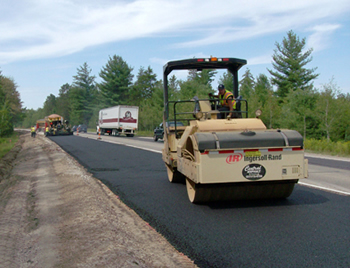 |
| The Michigan Department of Transportation's first performance contracting project includes rehabilitating 8.8 km (5.5 mi) of roadway on M-115 and replacing the superstructure on two bridges. |
To encourage the implementation of performance contracting, FHWA's Highways for LIFE (HfL) program has developed a Performance Contracting for Construction (PCfC) Implementation Framework. This framework was developed with input from several State highway agencies, the Associated General Contractors, and the American Road and Transportation Builders Association. HfL will also hold workshops in up to six pilot States to assist agencies with using performance contracting on specific projects. The first workshop was held in Lansing, Michigan, in April 2007. Officials and staff at the Michigan Department of Transportation (MDOT) were interested in learning more about how they could use performance contracting to improve quality and reduce construction time for a planned reconstruction of M-115 in Clare County. The project would include rehabilitating 8.8 km (5.5 mi) of roadway and replacing the superstructure on two bridges. The concrete pavement had originally been placed in 1940 and subsequently overlayed with hot-mix asphalt, while the two bridges had been built in 1938.
Workshop attendees included representatives from MDOT, FHWA's Michigan division office, and local contracting firms and industry associations. "The workshop laid the foundation for this performance contracting project," says Jack Hofweber of MDOT. "It was very helpful and covered both the establishment of good performance goals and how to measure and test performance."
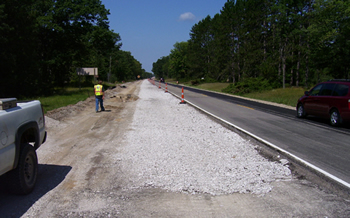 |
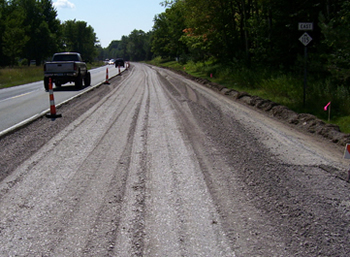 |
| Michigan's performance-based contract includes a 5-year pavement performance warranty. |
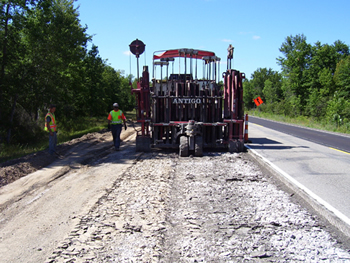 |
| The pavement is rubblized on M-115 in Clare County, Michigan. |
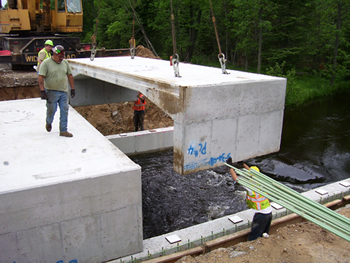 |
| The mid-section of the precast superstructure for a bridge on M-115 is placed as part of the Michigan Department of Transportation's performance contracting project. |
The workshop was invaluable," adds Tom Fudaly of FHWA's Michigan division office. "It helped guide all of us through the process of implementing performance contracting."
Michigan applied for and received $1 million in HfL funding for the project. The project was bid in December 2007, and construction began in spring 2008. Performance goals established by MDOT include baselines for when M-115 is to be fully open again to traffic; pavement performance, including ride quality; worker safety; and minimization of motorist delay. The $4.5 million contract includes up to $400,000 in incentives for meeting performance goals, as well as disincentives. While the initial cost for the performance-based contract is higher than a traditional contract would have been, "we believe it has increased the value and helped us achieve a better fix," says Hofweber.
Work on the new bridges is now complete. Phase two of the project, reconstructing the roadway, began in August. The project is expected to be completed by November 2008. If the road is open to traffic, as defined in the contract, before November 11, the contractor would meet the target performance goal. The contract includes a 5-year pavement performance warranty.
| The contract has helped to spur the use of innovations to meet the performance goals, including rapid bridge construction. |
"The planning and construction have gone very well to date," says Hofweber. An added benefit is that the contract has helped to spur the use of innovations to meet the performance goals, including rapid bridge construction. Accelerated bridge construction techniques such as prefabrication of the new bridge deck have been successfully used on the project. "This has definitely speeded up construction," says Fudaly. "We've been happy with the process and think that the use of the performance contract will result in a better quality job."
"Performance contracting has been a great learning experience for Michigan's contractors," says Douglas Needham of the Michigan Infrastructure and Transportation Association. "The cooperation and communication among industry, MDOT, and FHWA has proven beneficial throughout the process. Although cost is always a consideration when selecting a contractor, on future performance contracting projects, we would encourage an even greater emphasis be placed on innovation."
"As experience is gained with performance contracting, we would expect this alternative contracting method may even be competitive with or lower than the traditional low bid process," says Sorenson. "We have seen this as States have moved from using method-based mix designs to a contractor-furnished job mix formula for hot-mix asphalt. The effective contractor has been able to control costs when bidding his or her own job mix formula for hot-mix asphalt."
The HfL program will hold a PCfC Project Showcase in Clare, Michigan, on September 30, 2008. The showcase will include an overview of the PCfC framework, a discussion of MDOT's experiences with the M-115 project, and information on the contractor's perspective in constructing the project.
A second PCfC workshop was held August 26-28, 2008, in Tallahassee, Florida. The workshop focused on strategies for using performance contracting on a project on I-4 in Orlando. Participants included representatives from the Florida Department of Transportation, Florida Transportation Builders Association, and FHWA's Florida division office. "The workshop went very well. It allowed participants to discuss performance goals, share concerns, and provide insight," says Byron Lord of FHWA's HfL program. A third PCfC workshop is scheduled for Colorado in November.
For more information on Michigan's M-115 project, contact Jack Hofweber at MDOT, 989-775-6104, ext. 302 (email: hofweberj@michigan.gov), or Tom Fudaly in FHWA's Michigan division office, 517-702-1831 (email: thomas.fudaly@fhwa.dot.gov). To learn more about the PCfC Implementation Framework or becoming a HfL pilot State, contact Mary Huie at FHWA, 202-366-3039 (email: mary.huie@fhwa.dot.gov). The draft framework is available on the HfL Web site at www.fhwa.dot.gov/hfl/framework.
SHRP 2 Updates Available OnlineNew resources available on the Strategic Highway Research Program 2 (SHRP 2) Web site (www.trb.org/SHRP2) provide visitors with updates on SHRP 2 projects and progress, as well as opportunities for State transportation agencies to participate in the program's various research initiatives. Launched in 2006, SHRP 2 will develop recommended procedures, practices, and applications to advance the Nation's highway system in the key focus areas of safety, renewal, reliability, and capacity. The new SHRP 2 Annual Report for 2007, Asking Why to Learn How, highlights the progress the program has made in the four focus areas. The report includes an overview of the program and the goals of the four focus areas, information on current projects, and details on outreach activities. The report is available at onlinepubs.trb.org/onlinepubs/shrp2/SHRP2AnnualReport.pdf. Also available on the SHRP 2 site are quarterly program updates and information on partnership opportunities for transportation agencies to participate in SHRP 2 research projects. Current opportunities include projects in the capacity and renewal areas. This fall, SHRP 2 will start posting online project summaries that communicate the early outcomes of the program's research. For more information on SHRP 2, visit www.trb.org/SHRP2, or contact Linda Mason, Communications Officer for SHRP 2 at the Transportation Research Board (TRB), 202-334-3241 (email: SHRP2@nas.edu). SHRP 2 updates are also regularly featured in TRB's weekly Transportation Research e-newsletter. To subscribe to the newsletter, send an email with the subject header of "TRB E-Newsletter" to Rhouston@nas.edu. The newsletter is also posted online at trb.org/news/browse_newsletters.asp. |